Overview 
|
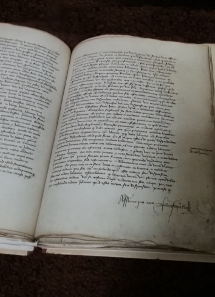 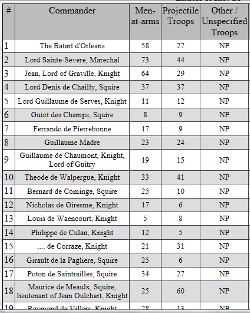
The Medieval History Database (MHDB)
is designed as a collection of translations, biographies, reviews, governmental, financial and military records, 3D reproductions, academic news and other material related to medieval history.
Begun in 2005, originally intended as standalone software, the
database is currently being redesigned and expanded as primarily an online collection, partly a searchable database and partly standard HTML articles. Online videos and interactive WebGL features
are also planned.
Volunteers willing to help with the project are welcome to use the contact form to describe your background in medieval history or software
development, and planned contribution to the database.
|
Search The Database
NOTE: searches sometimes time out or generate memory usage errors
due to the size of the database and the inefficiency of the (dated) search code. A more efficient system is currently in the planning
stages.
|
|
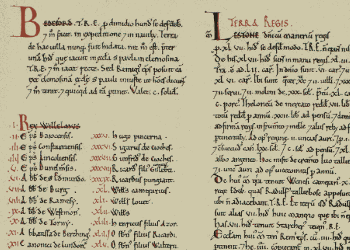
Domesday Book Database
In 1086 William "the Conqueror" ordered the compilation of a survey of every manor in his kingdom, a large volume later nicknamed "the Domesday Book". This survey has given historians
a rare look at precise economic data for thousands of locations across England. The information includes data for both 1086 and the situation twenty years earlier in 1066 prior to the new regime.
Feature Page
|
|
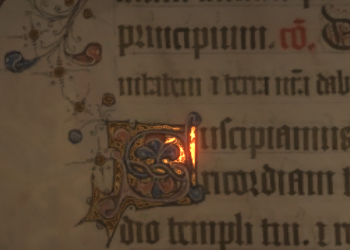
Gilded Artwork Rendering Project
MHDB's gilding rendering software can display the effects of light on gold and silver leaf, gesso, and other light-sensitive surfaces which normally
do not display correctly in a photograph or scan of medieval manuscripts, paintings and other artwork. The goal is to produce both a system for
displaying these effects and also a database of scanned or photographed items combined with the data needed to differentiate between different
types of surfaces.
Feature Page
|
|
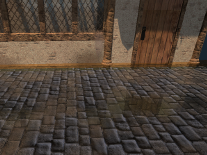
Cobblestone Street Generation
A procedural method of generating varied cobblestone streets is a new feature for MHDB's system of reconstructing medieval castles, cities and other locations in 3D.
|
|
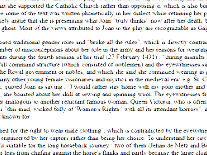
Conference : "Image and Narrative In Romanesque Art"
The seventh conference in the British Archaeological Association's international lecture series, entitled “Image and Narrative In Romanesque Art”, will be held at the British School in Rome from March 28-30, 2022.
|
|
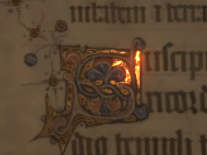
The Sherborne Missal
Article displaying a new video and still images from MHDB's gilded rendering software, in this case featuring pages from the Sherborne Missal (BL Add MS 74236),
one of the most lavishly decorated missals from medieval England.
|
|
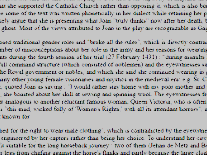
Conference : "Days of Justinian I"
The 9th Symposium on Byzantine and Medieval Studies, entitled “Days of Justinian I”, will be held in Skopje, North Macedonia, from November 12 - 14, 2021, hosted by
the Institute of National History in Skopje, Saints Cyril and Methodius University of Skopje and the University of Bologna.
|
|

Conference : Questioning The Crime Of Witchcraft
An upcoming academic conference entitled "Questioning the crime of witchcraft, definitions, receptions and realities (14th-16th centuries)" will be held
beginning on 20 May 2021, sponsored by the École des Hautes Etudes en Sciences Sociales.
|
|
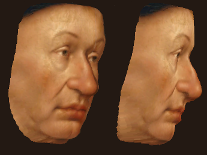
Facial Reconstruction of Medieval People
This project will reproduce realistic 3D facial models of medieval kings, dukes, and other personnages for whom surviving paintings or sculptures exist. Modern techniques can achieve a large degree of realism, sometimes photorealism, as well as lifelike animation of facial features, thereby bringing the dead to life.
|
|
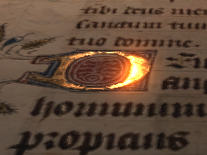
Gilded Manuscript Display Feature
Photographs of medieval gilded artwork do not adequate represent gilded areas since these areas are reproduced with only a single static color.
Work has now progressed on a software-based method (using WebGL to embed the software inside a webpage) that can
display light shining off gilded areas, as part of a planned addition of scanned medieval manuscripts and artwork to the Medieval History Database.
|
|
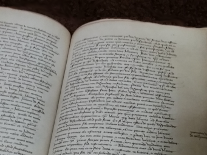
The "Chambre" of Nicholas Paynel, 1 May 1421
One of the smallest units in a late-medieval army was the "chambre", which consisted of about twenty men as a sub-unit of a "compagnie".
One of the chambre commanders in Normandy in 1421 was Nicholas Paynel, who then served under Duke Jehan II of Alencon (later made famous by
his many battles and sieges such as Verneuil, Jargeau, and Patay).
|
|
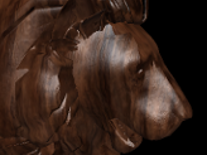
MHDB Wood Surface Effects
The Medieval History Database project includes standalone software to render 3D models of architecture, artwork, and other medieval items. To enhance realism, this software can add tiny
surface details to wood, such as grain texture, bumps, dents, and scratches, increasing the detail as the viewer gets closer rather than the video system's normal process of blurring surface textures while zooming in.
|
|
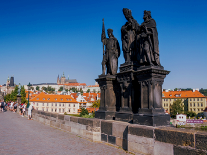
Construction of the Charles IV Bridge
Animated video of the construction method used for one of the most recognizable features of the city of Prague: the Charles IV Bridge, begun in 1357 as a replacement for the
earlier Judith Bridge which was badly damaged in 1346 by flooding. The Charles IV bridge now serves as a tourist favorite and oft-photographed icon of the city, especially its
famous clusters of statues, after surviving nearly 700 years.
|
|
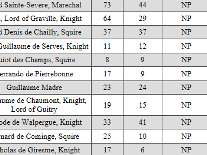
Armagnac Contingents At Orleans
A selection of pro-Armagnac units at the siege of Orleans which played a crucial role in the Hundred Years' War, from Charles VII's records.
|
|
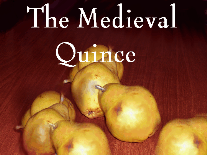
The Medieval Quince
Quinces (a pear-like fruit) were often used in the medieval period to make fruit jelly, since quinces contain large amounts of pectin. Originally a method of preserving
fruit for long periods, jelly was an important component of the pre-modern diet.
|
|